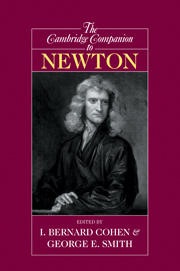Book contents
- Frontmatter
- Introduction
- 1 Newton's philosophical analysis of space and time
- 2 Newton's concepts of force and mass, with notes on the Laws of Motion
- 3 Curvature in Newton's dynamics
- 4 The methodology of the Principia
- 5 Newton's argument for universal gravitation
- 6 Newton and celestial mechanics
- 7 Newton's optics and atomism
- 8 Newton's metaphysics
- 9 Analysis and synthesis in Newton's mathematical work
- 10 Newton, active powers, and the mechanical philosophy
- 11 The background to Newton's chymistry
- 12 Newton's alchemy
- 13 Newton on prophecy and the Apocalypse
- 14 Newton and eighteenth-century Christianity
- 15 Newton versus Leibniz: from geometry to metaphysics
- 16 Newton and the Leibniz-Clarke correspondence
- Bibliography
- Index
8 - Newton's metaphysics
Published online by Cambridge University Press: 28 May 2006
- Frontmatter
- Introduction
- 1 Newton's philosophical analysis of space and time
- 2 Newton's concepts of force and mass, with notes on the Laws of Motion
- 3 Curvature in Newton's dynamics
- 4 The methodology of the Principia
- 5 Newton's argument for universal gravitation
- 6 Newton and celestial mechanics
- 7 Newton's optics and atomism
- 8 Newton's metaphysics
- 9 Analysis and synthesis in Newton's mathematical work
- 10 Newton, active powers, and the mechanical philosophy
- 11 The background to Newton's chymistry
- 12 Newton's alchemy
- 13 Newton on prophecy and the Apocalypse
- 14 Newton and eighteenth-century Christianity
- 15 Newton versus Leibniz: from geometry to metaphysics
- 16 Newton and the Leibniz-Clarke correspondence
- Bibliography
- Index
Summary
When one speaks of Newton's “metaphysics,” it should be noted that the word itself was rarely used by Newton; further, that in point of general philosophical usage, that word has not had in our own time a fixed and well-established acceptation. For the purposes of the present study, a rather broad view will be adopted - suggested on the one hand by Newton's most influential near predecessor, the previous author of a book called Principia Philosophiae, Descartes, according to whom metaphysics treats of the principles of [all] knowledge, and serves as the root of the “tree of philosophy” (whose “trunk” is physics, and whose “branches” are what we should call the “applied sciences”); and on the other by the author of the article “Metaphysics” in the eleventh edition of the Encyclopaedia Britannica, Thomas Case, who summarizes the concern of this discipline in the two questions: “ What is the world of things we know? How do we know it?” Thus metaphysics will here be understood to be the discussion of the most general features, both of the constitution of the world, and of the principles of human inquiry into the nature of the world.
It will be useful for our discussion to put Newton’s position in comparison with that of Descartes; for the work of the latter was both enormously influential in general – in the seventeenth century, and also, so far as metaphysics (in contrast to natural philosophy) is concerned, right down to the present day – and of great moment for Newton in particular.
- Type
- Chapter
- Information
- The Cambridge Companion to Newton , pp. 256 - 307Publisher: Cambridge University PressPrint publication year: 2002
- 30
- Cited by



